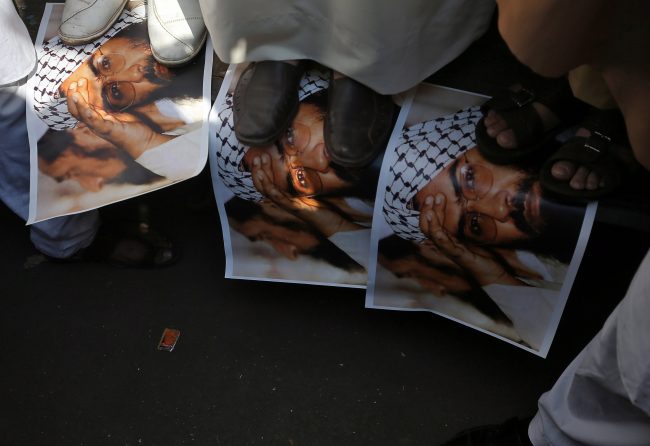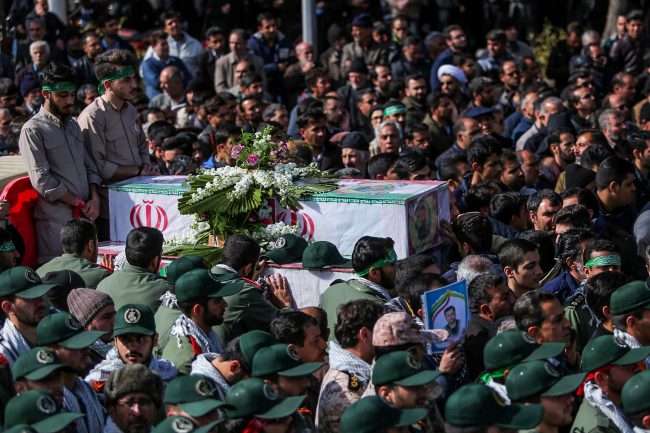Pakistan is facing accusations of harbouring terrorists from western neighbour Iran as well as eastern foe India after dozens of soldiers were killed in separate suicide attacks in the two countries.

Both India and Iran have warned of strong responses to the attacks, which they blame on militant networks based in Pakistan.
Kashmir attack on Indian paramilitary forces
Forty-four members of India’s paramilitary police were killed in a suicide car bomb attack in the disputed region of Kashmir on Thursday.
The Pakistan-based Islamist militant group Jaish-e-Mohammad (JeM) claimed responsibility for the attack, which was carried out by a 22-year-old man who was born in Indian Kashmir.
The group released a video that appeared to show the attacker condemning India for atrocities against Kashmiri Muslims.
In recent years, the Indian military has increasingly been accused of using excessive force and unlawful killings to curtail the insurgency in Kashmir, the country’s only Muslim-majority state.
READ MORE: India gets U.S. backing as it mulls action against Pakistan-based militants
Jaish-e-Mohammed militants previously stormed an Indian army camp in 2016, killing 20 soldiers. Weeks later, Indian Prime Minister Narendra Modi ordered “surgical strikes” on militant camps in the Pakistani side of Kashmir.
India has long accused Pakistan of sponsoring terrorist attacks by Jaish-e-Mohammed and other militant groups, with Pakistan’s Inter-Services Intelligence (ISI) suspected with helping create the group, as detailed by the Mapping Militants Project at Stanford University.
The group’s leader Masood Azhar remains at large in Pakistan, with the country refusing India’s demands to extradite him. Pakistan’s ally China has blocked India’s efforts to have Azhar designated a global terrorist at the United Nations Security Council.

Following Thursday’s attack, Modi said India would deliver a “befitting reply” to Pakistan, which said the attack was “a matter of grave concern” and denied any involvement.
India responded by withdrawing trade privileges granted to Pakistan under World Trade Organization rules, the country’s Minister of Finance Arun Jaitley said. He added that diplomatic steps were being taken “to ensure the complete isolation from international community of Pakistan.”
WATCH: Thousands attend funerals for police killed in Kashmir attack

G. Parthasarthy, India’s former high commissioner to Pakistan, told the Associated Press that a possible military response can’t be discussed in public. “We have said that Pakistan will pay a price,” he said. “For obvious reasons we are not going to spell out how that cost would be imposed.”

Get daily National news
India and Pakistan have twice gone to war over Kashmir since gaining their independence from Britain in 1947.
READ MORE: Pakistan talks up role in bin Laden killing after Trump says country ‘doesn’t do a damn thing’
Prime Minister Modi, who faces a tough general election in May, is under pressure from hardline groups to take decisive action.
“I think the situation is extremely tense,” Amitabh Mattoo, professor of international studies at New Delhi’s Jawaharlal Nehru University, told the Associated Press. “The mood in the country is extremely angry at what has happened. And moreover, there are elections in the offing. No party could afford to neglect public opinion.”
Social media was awash with calls for revenge while Indian TV news shows hosted jingoistic debates.
Iran border attack on Revolutionary Guards
On Saturday, Iran echoed India’s complaints, blaming Pakistan-based militants for the deaths of 27 Revolutionary Guards in a suicide bombing near the Iranian-Pakistani border earlier this week.
The Pakistan-based Sunni militant group Jaish-ul-Ad, which says it seeks greater rights for ethnic minority Baluchis, claimed responsibility for the attack.
“Pakistan will no doubt pay a high price.”
READ MORE: Iranian-Canadians mark ‘tragic’ 40th anniversary of Iran’s Islamic Revolution
Jafari was addressing a large crowd gathered for the funeral of the victims of the suicide bombing, which took place in a southeastern region where security forces are facing a rise in attacks by militants from the country’s Sunni Muslim minority.
“Just in the past year, six or seven suicide attacks were neutralized but they were able to carry out this one,” Jafari told the mourners, who packed a square in the central city of Isfahan and roads leading to it.

Jafari asked President Hassan Rouhani to give the Revolutionary Guard the go-ahead to retaliate.
Iran alleges that Saudi Arabia and the U.A.E. have helped prop up the Pakistan-based Jaish-ul-Adl. All three countries deny backing the militants.
On Saturday, India’s External Affairs Minister Sushma Swaraj met with Iran’s Deputy Foreign Affairs Minister Seyed Araghchi in Tehran.
“Iran & India suffered from two heinous terrorist attacks in the past few days, resulted in big casualties,” Araghchi tweeted. “Today in my meeting with Sushma Swaraj… we agreed on close cooperation to combat terrorism in the region. Enough is enough!”
— With files from the Associated Press and Reuters








Comments
Want to discuss? Please read our Commenting Policy first.